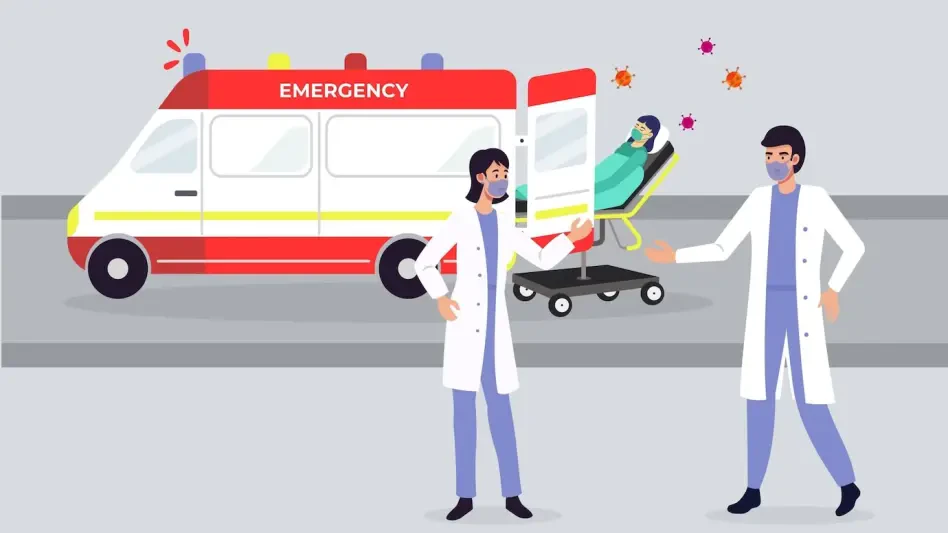The University of Cincinnati (UC) Medical Center, widely recognized for its cutting-edge emergency department facilities and pioneering contributions to emergency medicine, is undertaking a significant initiative to support physicians in El Salvador. This mission, spearheaded by Dr. Whitney Bryant and Dr. Daniel Artiga, aims to enhance the expertise of Salvadoran medical professionals in emergency medicine. Notably, this undertaking is not solely a professional engagement for Dr. Artiga; it holds profound personal importance given his Latin American heritage.
UC’s Legacy in Emergency Medicine
UC’s emergency medicine program stands out as the birthplace of the world’s first emergency medicine residency program, established in 1970. This pioneering history underscores UC’s role as a leader in the medical field. Dr. Bryant emphasizes the institution’s unwavering commitment to medical education and ultrasound training as cornerstones of UC’s emergency medicine program. The collaboration with Rosales National Hospital in San Salvador extends UC’s dedication to augmenting global medical education. This partnership reflects UC’s ongoing efforts to foster international medical advancement through specialized training and the dissemination of cutting-edge practices.
UC’s rich legacy in emergency medicine is built upon decades of excellence and innovation. The institution’s history is steeped in groundbreaking developments that have significantly shaped the landscape of emergency care worldwide. Dr. Bryant and Dr. Artiga carry forward this legacy as they embark on transformative work in El Salvador. Their involvement highlights UC’s steadfast commitment to pushing the boundaries of medical education and practice, ensuring that critical knowledge and skills are shared globally. This mission to San Salvador is a manifestation of UC’s enduring dedication to improving emergency medical services and fostering expertise on an international scale.
Emergency Medicine Progress in El Salvador
El Salvador is at a crucial juncture in the evolution of its emergency medicine specialty. The Rosales National Hospital, based in San Salvador, has initiated an emergency medicine residency program aiming to bridge the gap in specialized care. Despite these advances, the country still faces a significant shortage of certified emergency medicine physicians. Dr. Bryant and Dr. Artiga’s efforts are directed toward addressing this shortfall by providing advanced training to elevate the quality of emergency care available. This initiative is pivotal in ensuring that Salvadoran physicians are equipped with the requisite skills to deliver timely and effective emergency care.
The residency program at Rosales National Hospital represents a critical step forward for emergency medicine in El Salvador. By nurturing a new generation of medical professionals skilled in emergency care, the program aims to create a robust foundation for the specialty within the country. Dr. Bryant and Dr. Artiga’s involvement is instrumental in imparting advanced knowledge and techniques to these residents. Their expertise in emergency medicine and fluency in Spanish facilitate effective communication and teaching, ensuring that the training is both accessible and impactful. This progress, although nascent, marks an important milestone in El Salvador’s journey toward developing a sophisticated emergency medical care system.
Introduce Advanced Ultrasound Techniques
A significant component of the training offered by Dr. Bryant and Dr. Artiga is the introduction of advanced ultrasound techniques. Ultrasound technology plays a crucial role in emergency diagnostics, enabling physicians to make rapid, accurate bedside decisions. The training provided to Rosales residents will focus on the use of handheld ultrasound probes that connect to smartphones or tablets. This practical training method will combine lectures and hands-on sessions, starting with residents scanning each other, replicating the initial training procedures used for U.S. medical students. The integration of ultrasound into emergency care represents a substantial leap forward for Salvadoran medical professionals.
Dr. Bryant underscores the advantages of ultrasound technology, particularly its portability and cost-effectiveness. By equipping Rosales National Hospital staff with handheld probes, UC aims to enhance the diagnostic capabilities of Salvadoran emergency departments. Ultrasonography facilitates real-time interpretation, enabling immediate clinical decisions. This approach is highly beneficial in emergency scenarios where timely intervention is critical. The training will not only cover the technical aspects of ultrasound use but also emphasize its practical application in enhancing patient care and improving health outcomes. This initiative holds the potential to significantly transform the efficiency and effectiveness of emergency medical services in El Salvador.
Support From Atlas Global Health
The initiative gains substantial support from Atlas Global Health, a nonprofit organization committed to improving emergency departments in under-resourced areas. Atlas Global Health is contributing to the mission by dispatching representatives to San Salvador and donating an ultrasound machine to Rosales National Hospital. This partnership highlights the collaborative efforts aimed at raising the standards of emergency medical care in El Salvador. Atlas Global Health’s involvement exemplifies the synergistic approach necessary to drive meaningful progress in healthcare infrastructure and training, particularly in developing regions.
Atlas Global Health’s commitment underscores the importance of collaborative endeavors in global health improvement. By providing essential equipment and expertise, Atlas amplifies the impact of UC’s mission. The donated ultrasound machine represents a valuable resource that will aid in the practical application of the training provided by Dr. Bryant and Dr. Artiga. Such partnerships are crucial in bridging the resource gap and ensuring sustainable advancements in medical care. The combination of training, equipment provision, and ongoing support exemplifies the multifaceted approach needed to foster comprehensive improvements in emergency medicine practices in El Salvador, setting a precedent for similar initiatives globally.
Commitment to Global Health Initiatives
UC’s Division of Global Health, led by Dr. Bryant, is dedicated to extensive global health initiatives. The College of Medicine offers a two-year Global Health Fellowship that provides international clinical and educational opportunities. This fellowship is supported by a global health fund designed to facilitate resident travel for these initiatives. UC’s global health partnerships span across countries such as Uganda, Malawi, Ghana, Tanzania, Guatemala, and El Salvador. The mission to San Salvador is an integral component of UC’s broader strategy to elevate emergency care standards globally, reflecting a sustained commitment to international medical education and collaborative research.
UC’s comprehensive approach to global health emphasizes the importance of continuous learning and cross-border collaboration. The Global Health Fellowship aims to cultivate a deeper understanding of diverse healthcare systems and practices, enriching both the fellows and the communities they serve. These international opportunities contribute to a holistic learning experience, broadening the scope of medical education and practice. UC’s partnerships with hospitals worldwide facilitate the exchange of knowledge and expertise, fostering a global network dedicated to improving emergency medical care. The mission to El Salvador underscores UC’s proactive engagement in global health, paving the way for future initiatives that build on these foundational efforts.
Previous Global Health Efforts
Dr. Bryant’s prior work includes the delivery of a medical simulation course in Guatemala City, aimed at enhancing practical skills and promoting patient safety. This course utilized mannequins and lab simulations, providing a hands-on learning experience designed to reduce errors and instill a culture of safety in healthcare. Delivered entirely in Spanish, the course catered to medical professionals from Guatemala, Honduras, and El Salvador. Such initiatives exemplify UC’s dedication to improving healthcare standards across Latin America, underscoring the institution’s role in fostering inclusive and effective medical education tailored to regional needs.
The medical simulation course designed by Dr. Bryant is a testament to UC’s innovative approach to healthcare education. By employing realistic simulations, the course provided participants with invaluable opportunities to refine their clinical skills. The hands-on nature of this training is instrumental in building confidence and competence among healthcare professionals, ensuring that they are well-prepared to handle real-life medical situations. This initiative highlights UC’s emphasis on practical, experiential learning as a cornerstone of medical education. Dr. Bryant’s work in Guatemala City represents a successful model of how targeted training can substantially improve healthcare delivery and patient outcomes, setting a benchmark for future educational efforts.
Personal Commitment to Giving Back
The University of Cincinnati (UC) Medical Center, renowned for its state-of-the-art emergency department and groundbreaking advancements in emergency medicine, is launching an impactful initiative to support physicians in El Salvador. This initiative, led by Dr. Whitney Bryant and Dr. Daniel Artiga, strives to elevate the emergency medicine expertise of Salvadoran medical professionals. For Dr. Artiga, this mission goes beyond his professional duties; it has deep personal resonance due to his Latin American roots. This initiative not only aims to improve the skills of physicians in El Salvador but also hopes to foster a meaningful exchange of knowledge and best practices. The involvement of Dr. Artiga underscores the significant commitment and emotional investment in this project, reflecting his desire to give back to his heritage. This partnership aims to build a robust foundation for emergency medical care in El Salvador, ensuring both immediate and long-term benefits for the healthcare system and the community it serves.









